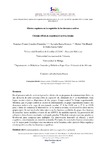Mostrar o rexistro simple do ítem
Efectos regulares en la cognición de los descansos activos
| dc.contributor.author | González Fernández, Francisco Tomás | |
| dc.contributor.author | Baena-Morales, Salvador | |
| dc.contributor.author | Vila Blanch, Moisès | |
| dc.contributor.author | García-Taibo, Olalla | |
| dc.date.accessioned | 2021-01-13T12:03:19Z | |
| dc.date.available | 2021-01-13T12:03:19Z | |
| dc.date.issued | 2020-09 | |
| dc.identifier.citation | González Fernández, F. T., Morales, S. B., Vila Blanch, M., & García Taibo, O. (2020). Efectos regulares en la cognición de los descansos activos. Sportis. Scientific Journal of School Sport, Physical Education and Psychomotricity, 6(3), 488-502. https://doi.org/10.17979/sportis.2020.6.3.6414 | es_ES |
| dc.identifier.issn | 2386-8333 | |
| dc.identifier.uri | http://hdl.handle.net/2183/27108 | |
| dc.description.abstract | [Resumen] En el presente artículo se investigaron los efectos de un programa de entrenamiento físico de una duración de ocho semanas sobre la cognición del alumnado de 1º de Bachillerato. Para lograr nuestro objetivo, dispusimos de dos grupos (Grupo control Vs Grupo experimental). Mientras, que el grupo control no realizó el entrenamiento, el grupo experimental realizó dos descansos activos a lo largo de una jornada escolar (1º A las 10:00 a.m. y 2º A las 12:30 p.m.). Antes de comenzar la intervención, en la primera semana, se tomaron los datos ambos grupos (pre). La intervención demostró su eficacia a nivel cognitivo, concretamente en atención sostenida. Por tanto, los resultados fueron coincidentes con la mayor parte investigaciones encontradas en la literatura sobre ejercicio físico regular y efectos positivos sobre las funciones cognitivas. | es_ES |
| dc.description.abstract | [Abstract] The present paper investigated the effect of a physical training program of 8-weeks on cognition of students of firs of high school to achieve or goal, we work with two groups (Control Group Vs Experimental Group). Control group did not to the intervention, the experimental group performed two active breaks during the school day (1 at 10:00 a.m. and 2 12:30 a.m.). Before to start the intervention, in first week, both groups (pre-intervention) data were registered. An intra-subject design with group condition factors was used. The reaction times were measured by a repeated measurement ANOVA. Perception of effort data was analyzed by performing T-Student tests corrected by a Bonferroni test for multiple comparisons. The intervention demonstrated its effectiveness at cognitive level, concretely in sustained attention. Therefore, results were consistent with most research found in the literature on regular physical exercise and positive effects on cognitive functions. | es_ES |
| dc.language.iso | spa | es_ES |
| dc.publisher | Universidade da Coruña | es_ES |
| dc.relation.uri | https://doi.org/10.17979/sportis.2020.6.3.6414 | es_ES |
| dc.rights | Atribución-NoComercial-SinDerivadas 4.0 España | es_ES |
| dc.rights.uri | http://creativecommons.org/licenses/by-nc-nd/4.0/es/ | * |
| dc.subject | Entrenamiento | es_ES |
| dc.subject | Descansos activos | es_ES |
| dc.subject | Cognición | es_ES |
| dc.subject | Vigilancia | es_ES |
| dc.subject | Training | es_ES |
| dc.subject | Active-breaks | es_ES |
| dc.subject | Cognition | es_ES |
| dc.subject | Vigilance | es_ES |
| dc.title | Efectos regulares en la cognición de los descansos activos | es_ES |
| dc.title.alternative | Chronic Effects in Cognition of Actives-Breaks | es_ES |
| dc.type | info:eu-repo/semantics/article | es_ES |
| dc.rights.access | info:eu-repo/semantics/openAccess | es_ES |
| UDC.journalTitle | Sportis | es_ES |
| UDC.volume | 6 | es_ES |
| UDC.issue | 3 | es_ES |
| UDC.startPage | 488 | es_ES |
| UDC.endPage | 502 | es_ES |






